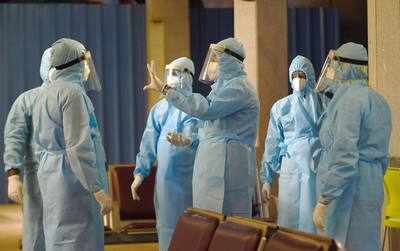‘Some PPEs feel like we’re wearing plastic rice bags’

Trussed up inside a plastic bag in the summer heat with sweat pouring down the body but afraid to drink water as it is impossible to take a loo break. This is how a nurse described the experience of wearing a personal protective equipment (PPE) suit. While there is no dearth of PPE any more, doctors and nurses say the quality is such that it's like wearing a plastic bag.
Doctors say hospitals are besieged by companies offering PPE kits. "The quality of most of what is offered is horrible. The fabric of many is like chawal ka thaila. There is zero breathability and so health workers find it impossible to wear it for long. That reluctance could endanger them," said a senior doctor.
The WHO guidelines on PPE strike a balance between protection against infection and allowing health workers "ease, dexterity, comfort and minimal heat-associated stress". However, the guidelines framed by the ministries of health and textiles only focus on the need to prevent blood or fluid penetration but have nothing about breathability. So, manufacturers focus on thickness of the plastic rather than the wearer's comfort.
"In the initial rush to overcome the shortage of PPE, it is understandable that the ministry did not think of all aspects. But it is unacceptable to allow people to use this opportunity to make money by supplying abysmal quality PPE and endangering the lives of health workers. The government should immediately issue clear-cut guidelines on quality of fabric and stitching and weed out the fake manufacturers cashing in on the sudden demand for PPE," said a doctor in a Covid hospital.
According to a manufacturer of protective wear, cheap plastic laminated fabric costs just Rs 150-200 per kilo. "So even with the cost of stitching, a poor quality PPE suit would cost only Rs 100- 200 to make but is sold for Rs 500-800. With such huge margins, getting even one small order for 10,000 PPE suits would mean a profit of at least Rs 30 lakh. This is why there is a such a huge rush of people getting into PPE making," he explained
Eight labs identified by the textile ministry to do quality checks on PPE have so far issued over 900 Unique Certification Codes (UCC), mandatory for PPE sellers, especially to land government contracts. The government says there are 600 companies manufacturing 4.5 lakh PPE suits per day. Many with the UCC have little or no experience in making protective wear. They include chemists, lingerie and footwear manufacturers, tent or tarpaulin makers, wholesale traders of drugs, small-time pharma companies, and even a food company. "Anyone who has a garage to store the stuff can buy some fabric and organize some tailors to copy a PPE suit," said an industry insider.
"One PPE lot supplied to us had electrical insulation tapes used to seal the seams. Obviously, they started coming off when we moved around," said a doctor in a private hospital. Another doctor in a government Covid hospital pointed out that the government only tested the coverall, but other components like face shields or goggles that came with it were substandard. Almost all hospitals seem to have PPE horror stories to narrate.
The government is at pains to reiterate that its certification is only for the coverall and that only a Synthetic Blood Penetration Test (SBPT) has been conducted.
Every UCC states that the certificate is based solely on the sample submitted by the applicant. It goes on to state: "The procurement agency is advised to conduct priRead More – Source
[contf] [contfnew] ![]()
times of india
[contfnewc] [contfnewc]



